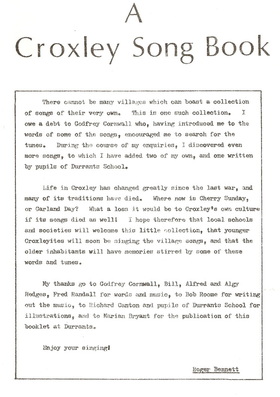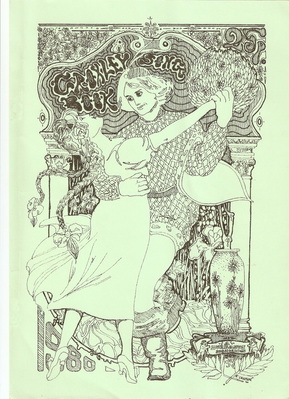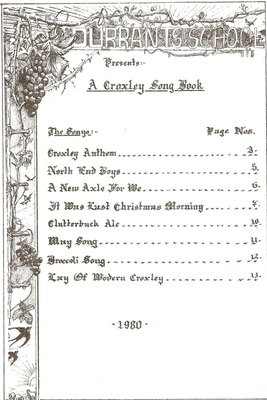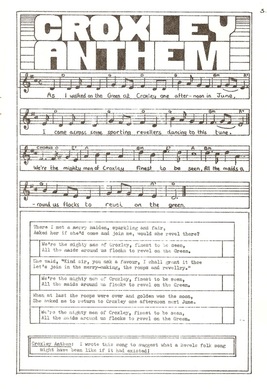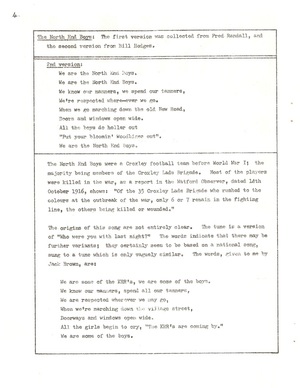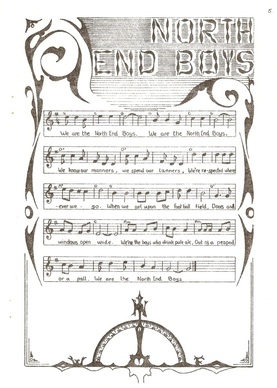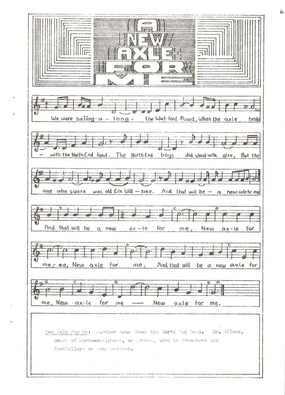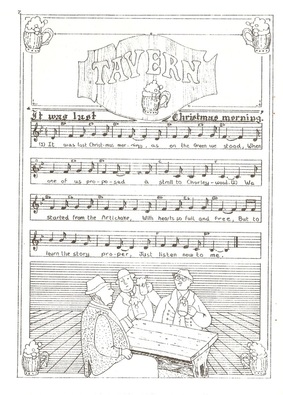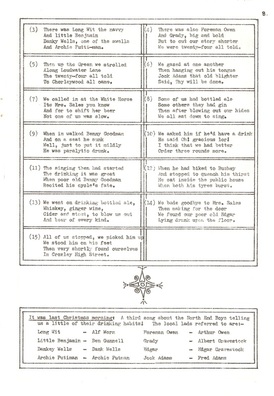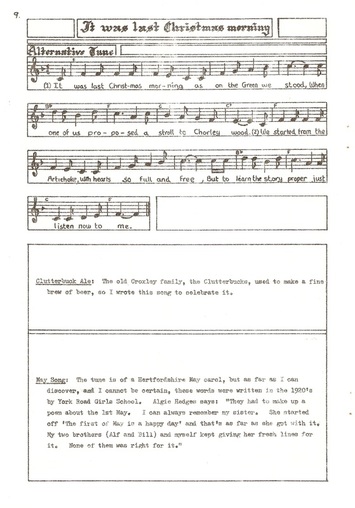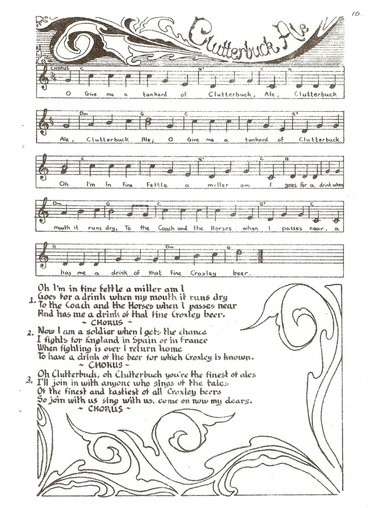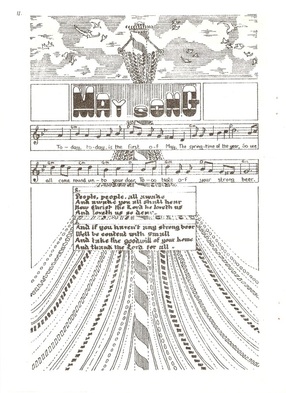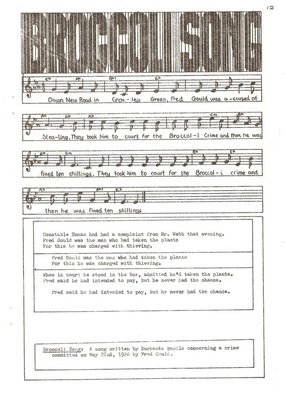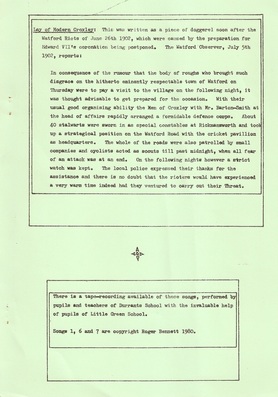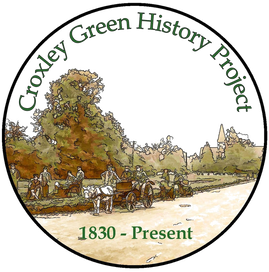Songs of Croxley
Roger Bennett a teacher, wrote the following whilst he was a teacher at Durrants School.
Croxley Green.
A sprawl of suburbia lying between Watford and Rickmansworth. No-one, as he trundled along the A412, would even consider stopping on his way through commuter country. Yet unknown to the traveller, there are, scattered somewhere amongst the roads, drives and closes, some older folk who remember.
They remember Croxley Green before the building projects of the post-war years; they recall the expansion of the 1930's housing programme; they think of the coming of the Metropolitan railway in 1925. This was the cataclysmic event which severed the village in two parts. Thenceforth, unity was gone, and sprawling housing estates did not quite matter so much.
This article is about a time when Croxley was a true village, with most important buildings surrounding the green, and with most roads leading to the green.
A link between 1981 and the first two decades of this century is a group of songs which is Croxley's very own heritage. These songs lay dormant in the memory of some of the older croxleyites until I first stumbles upon some lines in a pamphlet on Croxley written by Godfrey Cornwall. Elaborating on these entailed visiting many homes, armed with a friendly smile and a tape recorder. Thus, within a few weeks, I possessed a cassette concoction of information, comment, reminiscence, and song. In order to make the songs available to Croxley as a living historical document which would give pleasure to songsters, a new cassette was recorded containing the songs as performed by children from Durrants and Little Green Schools plus some of the teachers. The recording also featured the original renderings and two Croxley songs of my own, written in the traditional folk song mode, plus another of which the words were written by some Durrants School pupils. Further, the words and music of all the songs were published in an illustrated, annotated booklet.
Following a chronolgical order, the first song is, 'The Lay of Modern Croxley.' This was written as a piece of doggerel soon after the Watford Riots of June 26th 1902, which were caused by the postponement of the preparartions for the Edward V11's coronation. The Watford Observer, July 5th 1902 reports:
In consequence of the rumour that the body of roughs who brought such disgrace on the
hitherto eminently respectable town of Watford it was thought advisable to get prepared for the
occasion. With their usual good organising ability, the Men of Croxley with Mr. Barton-Smith
at the head of the affairs rapidly arranged a formidable defence corps. About 40 stalwarts were
sworn in as special Constables at Rickmansworth and took up a strategical position on the
Watford Road with the cricket pavillion as headquarters. The whole of the roads were also
patrolled by small companies and cyclists acted as scouts till past midnight, when all fear of an
attack was at an end. On the following night however, a strict watch was kept. The local police
expressed their thanks for the assistance and there is no doubt that the riotors would have
experienced a very warm time indeed had they ventured to carry out their threat.
As far as I know, the six verses were not written to be sung, but I have added a folk tune, and a necessary suffix -man- to make it a lusty singalong song:
The Croxleyites were sad at heart; their speech came faint and low-man
As gathering on the upland green, they feared the rampant foe-man.
Their van will be upon our flank 'ere Cassio's bridge goes down-man.
If once they gain the Half Way House, no, power can save the town-man.
There are three songs about the North End Boys who were a Croxley football team before the First World War, the majority being members of the Croxley Lads Brigade. Most of the players were killed in the war, as a report in the Watford Observer, 14th October 1916, shows: “Of the 35 Croxley Lads Brigade who rushed to the colours at the outbreak of the war, only 6 or 7 remain in the fighting line, the others being killed or wounded.”
The origins of the song, 'The North End Boys' are not clear. The tune is a version of 'Who were you with last night?' The words indicate that several versions may have existed- I found two; they certainly seem to be based on a national song of the time, sung to a tune that is olny vaguely similar. The national song goes:
We are some of the KRR's, we are some of the boys.
We know our manners, spend all our tanners,
We are respected wherever we may go.
Whenwe go marching down the village street
Doorways and windows open wide.
All the girls begin to cry, “The KRR's are coming by.”
We are some of the boys.
A version of 'The North End Boys' runs:
We are the North End Boys, we are the North End Boys.
We know our manners, we spend our tanners,
We're respected wherever we go.
When we get upon the football field
Doors and windows open wide.
We're the boys who drink pale ale,
Out of a pea-pod or a pail,
We are the North End Boys.
Another song about the North End Boys is sung to an old Sanky tune. Mr. Wilbee, in the song was the owner of a horse-omnibus used to transport the footballers to away matches. The song, surely sung with several harmonies, tells of a journey of mishap:
We were sailing along the Watford Road
When the axle broke with the North End Load.
The North End Boys did shout with glee
But the one who swore was old Ern Wilbee.
And that will be a new axle for me.
A third song about the footballers concerns a Christmas pub crawl, and is particularly interesting for its mention of several local worthies as well as the two entirely different tunes:
It was last Christmas morning as on the green we stood,
When one of us proposed a stroll to Chorleywood.
We started from the Artichoke with hearts so full and free,
But to learn the story proper just listen now to me.
There was Long Wit the navvy and little Benjamin,
Dankey Wells, one of the swells, and Archie Putti-man,
There was also Foreman Owen and Grady, big and bold;
But to cut our story shorter, we was 24 all told.
Although the words of the 'May Song' are largely derivative, I have not found an identical version. The song seems to have been written in the 1920's by Yorke Road Girls' School, a forerunner of Durrants School. One of my sources, Algie Hedges, told me: “They had to make up a poem about the 1st May. I can always remember my sister. She started off 'The first of May is a happy day' and that's as far as she got with it”
Today, today is the first of May, the springtime of the year.
So we all come round unto your door to taste of your strong beer.
The remaining three songs in the collection are homespun. The 'Broccoli Song' tells of an actualcrime committed on may 22nd 1926 by Fred Gould, who was fined 10 shillings for stealing Mr. Webb's broccoli plants. The words were written in a Creative Arts class, and a Hertfordshire folk tune added. 'Clutterbuck Ale' is a eulogy for a beer which was once made by a local Croxley family:
Oh Clutterbuck, oh Clutterbuck, you're the finest of ales.................
Finally, I wrote 'Croxley Anthem' to suggest what the Croxley Revels, an annual carnival/fair, might have been like in days of yore. It's a boy meets girl song of which the chorus is:
We're the mighty men of Croxley, finest to be seen
All the maids around us flocks to revels on the Green.
Croxley Green.
A sprawl of suburbia lying between Watford and Rickmansworth. No-one, as he trundled along the A412, would even consider stopping on his way through commuter country. Yet unknown to the traveller, there are, scattered somewhere amongst the roads, drives and closes, some older folk who remember.
They remember Croxley Green before the building projects of the post-war years; they recall the expansion of the 1930's housing programme; they think of the coming of the Metropolitan railway in 1925. This was the cataclysmic event which severed the village in two parts. Thenceforth, unity was gone, and sprawling housing estates did not quite matter so much.
This article is about a time when Croxley was a true village, with most important buildings surrounding the green, and with most roads leading to the green.
A link between 1981 and the first two decades of this century is a group of songs which is Croxley's very own heritage. These songs lay dormant in the memory of some of the older croxleyites until I first stumbles upon some lines in a pamphlet on Croxley written by Godfrey Cornwall. Elaborating on these entailed visiting many homes, armed with a friendly smile and a tape recorder. Thus, within a few weeks, I possessed a cassette concoction of information, comment, reminiscence, and song. In order to make the songs available to Croxley as a living historical document which would give pleasure to songsters, a new cassette was recorded containing the songs as performed by children from Durrants and Little Green Schools plus some of the teachers. The recording also featured the original renderings and two Croxley songs of my own, written in the traditional folk song mode, plus another of which the words were written by some Durrants School pupils. Further, the words and music of all the songs were published in an illustrated, annotated booklet.
Following a chronolgical order, the first song is, 'The Lay of Modern Croxley.' This was written as a piece of doggerel soon after the Watford Riots of June 26th 1902, which were caused by the postponement of the preparartions for the Edward V11's coronation. The Watford Observer, July 5th 1902 reports:
In consequence of the rumour that the body of roughs who brought such disgrace on the
hitherto eminently respectable town of Watford it was thought advisable to get prepared for the
occasion. With their usual good organising ability, the Men of Croxley with Mr. Barton-Smith
at the head of the affairs rapidly arranged a formidable defence corps. About 40 stalwarts were
sworn in as special Constables at Rickmansworth and took up a strategical position on the
Watford Road with the cricket pavillion as headquarters. The whole of the roads were also
patrolled by small companies and cyclists acted as scouts till past midnight, when all fear of an
attack was at an end. On the following night however, a strict watch was kept. The local police
expressed their thanks for the assistance and there is no doubt that the riotors would have
experienced a very warm time indeed had they ventured to carry out their threat.
As far as I know, the six verses were not written to be sung, but I have added a folk tune, and a necessary suffix -man- to make it a lusty singalong song:
The Croxleyites were sad at heart; their speech came faint and low-man
As gathering on the upland green, they feared the rampant foe-man.
Their van will be upon our flank 'ere Cassio's bridge goes down-man.
If once they gain the Half Way House, no, power can save the town-man.
There are three songs about the North End Boys who were a Croxley football team before the First World War, the majority being members of the Croxley Lads Brigade. Most of the players were killed in the war, as a report in the Watford Observer, 14th October 1916, shows: “Of the 35 Croxley Lads Brigade who rushed to the colours at the outbreak of the war, only 6 or 7 remain in the fighting line, the others being killed or wounded.”
The origins of the song, 'The North End Boys' are not clear. The tune is a version of 'Who were you with last night?' The words indicate that several versions may have existed- I found two; they certainly seem to be based on a national song of the time, sung to a tune that is olny vaguely similar. The national song goes:
We are some of the KRR's, we are some of the boys.
We know our manners, spend all our tanners,
We are respected wherever we may go.
Whenwe go marching down the village street
Doorways and windows open wide.
All the girls begin to cry, “The KRR's are coming by.”
We are some of the boys.
A version of 'The North End Boys' runs:
We are the North End Boys, we are the North End Boys.
We know our manners, we spend our tanners,
We're respected wherever we go.
When we get upon the football field
Doors and windows open wide.
We're the boys who drink pale ale,
Out of a pea-pod or a pail,
We are the North End Boys.
Another song about the North End Boys is sung to an old Sanky tune. Mr. Wilbee, in the song was the owner of a horse-omnibus used to transport the footballers to away matches. The song, surely sung with several harmonies, tells of a journey of mishap:
We were sailing along the Watford Road
When the axle broke with the North End Load.
The North End Boys did shout with glee
But the one who swore was old Ern Wilbee.
And that will be a new axle for me.
A third song about the footballers concerns a Christmas pub crawl, and is particularly interesting for its mention of several local worthies as well as the two entirely different tunes:
It was last Christmas morning as on the green we stood,
When one of us proposed a stroll to Chorleywood.
We started from the Artichoke with hearts so full and free,
But to learn the story proper just listen now to me.
There was Long Wit the navvy and little Benjamin,
Dankey Wells, one of the swells, and Archie Putti-man,
There was also Foreman Owen and Grady, big and bold;
But to cut our story shorter, we was 24 all told.
Although the words of the 'May Song' are largely derivative, I have not found an identical version. The song seems to have been written in the 1920's by Yorke Road Girls' School, a forerunner of Durrants School. One of my sources, Algie Hedges, told me: “They had to make up a poem about the 1st May. I can always remember my sister. She started off 'The first of May is a happy day' and that's as far as she got with it”
Today, today is the first of May, the springtime of the year.
So we all come round unto your door to taste of your strong beer.
The remaining three songs in the collection are homespun. The 'Broccoli Song' tells of an actualcrime committed on may 22nd 1926 by Fred Gould, who was fined 10 shillings for stealing Mr. Webb's broccoli plants. The words were written in a Creative Arts class, and a Hertfordshire folk tune added. 'Clutterbuck Ale' is a eulogy for a beer which was once made by a local Croxley family:
Oh Clutterbuck, oh Clutterbuck, you're the finest of ales.................
Finally, I wrote 'Croxley Anthem' to suggest what the Croxley Revels, an annual carnival/fair, might have been like in days of yore. It's a boy meets girl song of which the chorus is:
We're the mighty men of Croxley, finest to be seen
All the maids around us flocks to revels on the Green.
